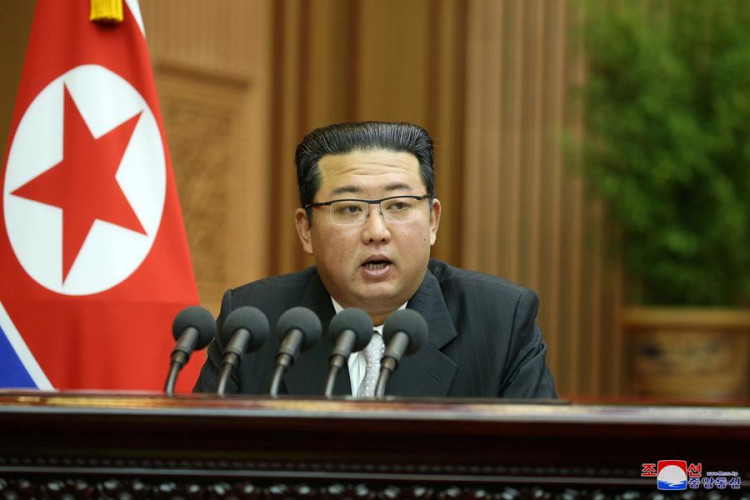North Korea launched a series of short-range ballistic missiles into its eastern sea on Tuesday morning, a move that the South Korean military called a deliberate show of force just hours before the U.S. presidential election. The launches, marking Pyongyang's latest missile activity in recent days, add to the mounting regional tensions that are intensifying amid fears of escalating conflict on the Korean Peninsula.
According to South Korea's Joint Chiefs of Staff, the missiles, launched around 7:30 a.m. local time, traveled approximately 250 miles. The missiles landed outside of Japan's exclusive economic zone, confirmed Japanese Prime Minister Shigeru Ishiba, who said there were no immediate reports of damage.
The missile tests come only days after North Korean leader Kim Jong Un supervised a test of the country's latest intercontinental ballistic missile (ICBM), a move that drew a strong response from the United States. On Sunday, the U.S. deployed a B-1B bomber in a joint drill with South Korean and Japanese forces. North Korea's Kim Yo Jong, Kim Jong Un's influential sister, quickly condemned the exercise, calling it "another clear display of hostile, aggressive nature" by the U.S. and its allies.
Kim Yo Jong's statement, issued through the Korean Central News Agency (KCNA), asserted that these joint exercises justify North Korea's nuclear strategy. "This drill validates the urgency of building up our nuclear forces as a necessary deterrent against aggression," she stated, adding that North Korea's weapons program is now more crucial than ever.
These missile launches are believed to be part of Pyongyang's strategy to leverage its military capabilities for diplomatic gains. "North Korea is clearly seeking to grab Washington's attention," said Han Kwon-hee of the Korea Association of Defense Industry Studies. "With the election underway, North Korea aims to highlight its nuclear deterrent in hopes of gaining concessions in future negotiations."
The timing of North Korea's recent missile launches, so close to the U.S. presidential election, raises questions about how Kim's regime may seek to exploit potential shifts in American policy. Analysts suggest that Pyongyang might prefer a Trump administration, given the history of Trump's direct diplomacy with Kim Jong Un in 2018-19. Kamala Harris, Trump's opponent, has taken a harder stance on North Korea, recently stating she would not "cozy up to tyrants and dictators like Kim Jong Un."
North Korea's activities have heightened concerns in the region, especially given recent allegations that Pyongyang has supplied military support to Russia for its conflict in Ukraine. On Monday, U.S. State Department spokesperson Matthew Miller stated that as many as 10,000 North Korean soldiers were stationed in Russia's Kursk region, near the Ukrainian border. According to Miller, these forces could soon participate in combat, which would mark North Korea's first engagement in a major international conflict since the Korean War.
The situation has raised alarm in Seoul, where officials worry that Russia might reciprocate with military technology transfers that could enhance North Korea's missile program. "Such exchanges would gravely endanger global non-proliferation efforts and destabilize peace on the Korean Peninsula," stated Jeon Ha-gyu, spokesperson for South Korea's Defense Ministry.
In response to North Korea's escalating actions, the U.S., South Korea, and Japan have intensified their combined military drills and revamped their joint defense strategies, including nuclear deterrence plans. These efforts aim to counteract North Korea's advancing nuclear arsenal, which has rapidly expanded in both capacity and sophistication under Kim Jong Un's rule.
The missile tests underscore North Korea's longstanding claim that joint U.S.-South Korean military exercises are disguised rehearsals for invasion. North Korea has repeatedly used these exercises to justify its development of nuclear weapons and other advanced military technologies. In a statement to the United Nations on Monday, North Korea's ambassador Kim Song defended the nation's nuclear program, calling it a "necessary response" to perceived threats from the United States.
Meanwhile, the international community continues to push for accountability from North Korea over its expanding weapons program. U.S. Deputy Ambassador to the U.N. Robert Wood urged action, criticizing Russia and China for preventing a unified U.N. Security Council response. Wood accused both countries of "repeatedly shielding the DPRK," which, he said, enables North Korea to defy U.N. sanctions with impunity.
Russia, however, dismissed the U.S.'s position as hypocritical, with Russian Deputy Foreign Minister Andrey Rudenko calling North Korea's missile tests a justified reaction to "provocations" from the United States. The Russian stance reflects the country's strengthening ties with Pyongyang amid its own diplomatic isolation following the Ukraine invasion.
On the same day as North Korea's missile launches, the U.S. State Department approved a $5 billion military aid package to South Korea, including advanced airborne early warning and control systems. The equipment, known as Wedgetails, is intended to bolster South Korea's ability to detect and intercept missile threats. "This proposed sale will significantly enhance the Republic of Korea's surveillance and defense capabilities," the State Department said in a statement.
This military package is the latest example of the U.S.'s ongoing commitment to its alliance with South Korea, despite the complex and escalating security environment in the region. The relationship between the U.S., South Korea, and Japan remains vital for countering North Korea's nuclear threat, a factor that has been further underscored by recent developments.
North Korea's series of missile launches and increased military posturing indicate that the country is not retreating from its nuclear ambitions. If anything, Pyongyang appears determined to increase its leverage as it watches the outcome of the U.S. presidential election. "North Korea's intent is clear," said Leif-Eric Easley, a professor at Ewha University in Seoul. "Pyongyang is not only pushing its nuclear agenda but also demonstrating that its alliance with Moscow strengthens its hand in regional politics."
This article includes reporting from The Associated Press and ABC News.




